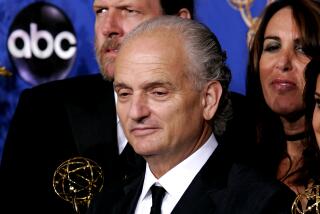Scholars parse ‘Sopranos’ at symposium
- Share via
NEW YORK -- Tony Soprano, the TV mob boss who seemed to spend as much time with his psychotherapist as his consigliere, was no stranger to analysis.
But not this kind: “Body of Evidence: Tony Soprano’s Corporeal Battle.” “Episode 5, or When Does a Narrative Become What It Is?” “Carmela Soprano as Emma Bovary: European Culture, Taste and Class in ‘The Sopranos.’ ”
Nearly a year after the smash series’ finale left fans guessing what it all meant, dozens of scholars gathered at Fordham University Friday to parse what “The Sopranos” had to say about such topics as gender roles, the justice system, race relations and healthcare. The conference, which is open to the public, spans four days and 60 research presentations. It’s expected to draw an audience of hundreds of researchers and fans.
It’s tempting to wonder whether any phrase has been left unturned in discussions of the HBO hit, which ran from January 1999 until its famously oblique ending in June 2007. It inspired exhaustive media criticism and books on psychology, criminology, cooking, even waste management.
“One of the deepest issues in the academic world is the relationship between fiction and reality,” said Fordham communication and media studies chairman Paul Levinson, who organized the conference with colleagues at Fordham, Suffolk County Community College and Brunel University in London. As a fictional lens on the true-life phenomenon of organized crime, Levinson says, “ ‘The Sopranos’ typifies that fascinating intersection.”
There were discussions linking “The Sopranos” with Yeats, playwright Tom Stoppard and novelist and short story writer Flannery O’Connor. Other researchers delved into the show’s dream sequences, use of silence and approach to epistemology.
More to Read
The biggest entertainment stories
Get our big stories about Hollywood, film, television, music, arts, culture and more right in your inbox as soon as they publish.
You may occasionally receive promotional content from the Los Angeles Times.










